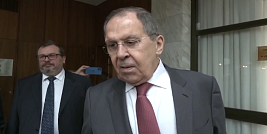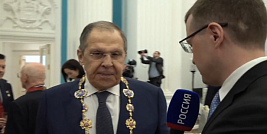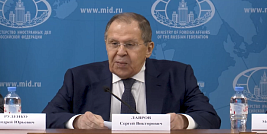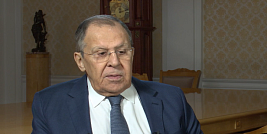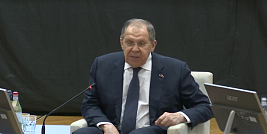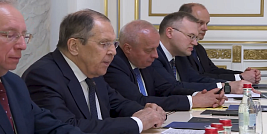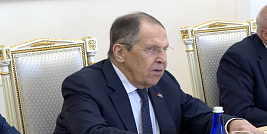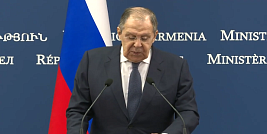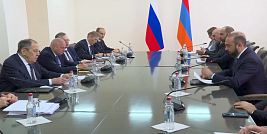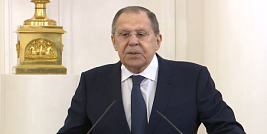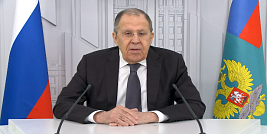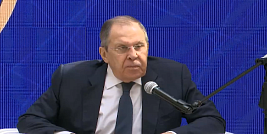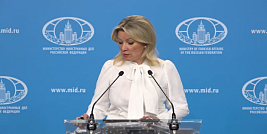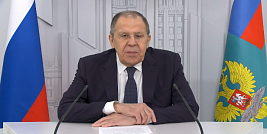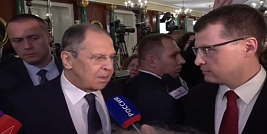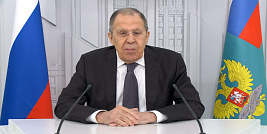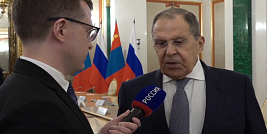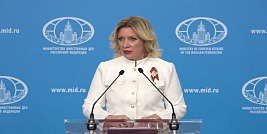Foreign Minister Sergey Lavrov’s remarks and answers to questions at a Diplomatic Club meeting, Moscow, May 15, 2025
Colleagues,
Your Excellency,
Friends,
It is a pleasure to welcome you on this wonderful occasion. The Diplomatic Club has resumed its activities.
We used this format for quite some time. It was very popular. Then, the pandemic broke out followed by post-pandemic inertia. After the special military operation had begun, we introduced the Minister’s meetings with ambassadors to clarify our Ukraine crisis-related actions. We have held eight such meetings so far, and the ninth one will be held soon.
It’s gratifying to see the full-fledged work of the Diplomatic Club resume. It will focus on a wide range of issues that are of interest to you. Our expert community, academia, cultural and artistic figures, and, of course, representatives from Russian regions will take part in the club’s meetings. I’m pleased to see Nizhny Novgorod Region Governor Gleb Nikitin, who pays great attention to external factors in his region’s development and to strengthening ties in the context of our foreign policy.
We want everyone who works with the Foreign Ministry’s Diplomatic Academy engage in these activities. This platform gave birth to the Diplomatic Club’s traditions. I would like to thank Acting Rector Sergey Shitkov and everyone else who made this event possible, as well as VEB.RF, for providing the opportunity. Russian business is a very important part of your work in the Russian capital. We will do our best to ensure that business diplomacy helps you better understand the tasks set before you by your leadership and determine the most effective ways to fulfil them.
I would like to make a brief introduction and then we will have an interactive dialogue which is the most engaging part of any back and forth with the audience.
Contrary to the predictions of futurists, the diplomatic profession continues to be highly relevant. This is becoming ever clearer each day. True, they say that artificial intelligence is hot on our heels. But a diplomat’s heels are sturdy and certainly not an Achilles’ heel. If you’re a true diplomat, no artificial intelligence will ever replace your natural intelligence, intuition, experience, and erudition. The erudition of artificial intelligence is somewhat different, and we’ve all had the chance to see what it is.
Only a living person with real-world experience and knowledge can find creative solutions. That is what diplomacy is all about. There are many creative and innovative solutions of that kind that are grounded in strong principles and a balance of interests to prevent the recurrence of crises. Everyone is focused on Ukraine in light of the developments unfolding in Istanbul. But let’s not forget the Gaza tragedy and, more broadly, the tragedy of the Palestinian territories and other Middle East issues created by the utterly reckless and aggressive policies of NATO countries that resort to armed force without thinking twice as soon as they spot something or someone that’s not to their liking.
Iraq was laid to waste and later it became clear that it was destroyed for no reason at all, because there were no weapons of mass destruction in that country. The upshot? Tony Blair expressed regret in his memoirs, and that was it. Libya was destroyed merely to take revenge on Muammar Gaddafi for his independent policies and to cover up the fact that he provided funding to a presidential candidate in France. The candidate, who later became president, was very keen on hiding the evidence that he had received money from a foreign country. These examples abound. All of that was done under dramatic declarations about upholding democracy, human rights, and other such things.
In addition to ongoing crises, I would like to also mention Yemen and the situation involving the Houthi movement. There are situations that call for negotiating skills. Consider the Iranian nuclear programme, or a host of other issues arising from geopolitical transformation and competition where ambitions collide. Take the current developments in the Asia-Pacific region which the West is now calling the Indo-Pacific region in order to impart its policies a clear anti-China slant. In doing so, the West hopes to pit our great friends and neighbours, India and China, against each other. This is the divide and conquer policy, which President Vladimir Putin mentioned recently.
The Asia-Pacific region is home to some of the most important geopolitical spaces, such as Central Asia. A great number of diplomatic processes are unfolding around it. The C5+1 format has been established with more than a dozen countries showing the sheer number of those who are eager to build relations with our Central Asian friends.
Consider what is happening in and around Southeast Asia. Just like in every other part of the world, our Western colleagues want to play the leading role here as well and to undermine the centrality of ASEAN, which has been universally accepted for decades. ASEAN’s role was based on creating a unifying regional space with its dialogue partners in politics, military cooperation, and defence. All of that operated according to the rules devised and approved by ASEAN members themselves. When joining the format, every dialogue partner solemnly pledged to follow them.
Our Western colleagues are gradually pushing aside rules of consensus and rules underlying the efforts to find common ground in an attempt to lure certain ASEAN members into openly confrontational rather than unifying sets of three or four countries. NATO Secretariat leaders are earnestly saying that, despite being an alliance created for the defence of its members’ territories, they are “compelled” to expand their infrastructure into Southeast Asia, the Taiwan Strait, and the South China Sea, supposedly because these regions now pose direct military threats to the Alliance. Clearly, such claims are pure fantasy of a rather unseemly nature.
Of course, there are regional processes as well. I mentioned the Iranian nuclear programme, but there are also ongoing processes between all coastal states of the Gulf, namely, Iran and the Gulf Cooperation Council, which includes six Arab monarchies. These states are also in the process of normalising relations, which we wholeheartedly welcome.
Eurasia, our continent, is home to great civilisations, China and India. The Ottoman civilisation is undergoing a revival as well. We hope this revival will be harmonised with other sub-regional trends, so that these millennia-old processes do not contradict each other, but instead come to fruition as an example of coexistence. There are no other continents like Eurasia, where so many civilisations not only coexist but have retained their identity and relevance in the modern era.
At the same time, Eurasia remains the only continent that does not have its own pan-continental entity. Africa has the African Union that is a big friend of ours. True, they have sub-regional formats as well, but the AU stands above them as a unifying entity. Latin America and the Caribbean also have many sub-regional integration initiatives, but there is also the Community of Latin American and Caribbean States (CELAC), which is a continental entity. Eurasia doesn’t have anything like that. There is a clear need for such a unifying process that can harmonise the interests of many large and truly great powers and civilisations. So far, these types of processes have only been observed in Western Eurasia, and even those have largely been based on Euro-Atlantic concepts such as NATO and the OSCE, which was originally created as a Euro-Atlantic entity. That even includes the European Union which might sound strange, but I will explain.
Sure enough, the European Union was created for entirely different purposes. It was created to pool efforts and to promote more effective economic growth among European countries, making it easier to address multiple social problems facing post-war Europe. However, more recently, the EU has also morphed into a Euro-Atlantic construct, and everything it does gets coordinated with NATO. A couple of years ago, a Joint Declaration on NATO-EU Cooperation was signed, under which the EU pledged to provide its resources, including territory, transport infrastructure, and anything else NATO may need should it, for the sake of argument, wish to move more troops and military hardware closer to Russia’s borders. It’s being talked about quite openly.
With regard to the remaining portion of the Eurasian continent, first President of Kazakhstan Nursultan Nazarbayev once came up with a valuable initiative to create a Conference on Interaction and Confidence Building Measures in Asia (CICA). This initiative has made notable strides over the years. Now, after many years of Kazakhstan’s leadership, Azerbaijan holds the chairmanship, and the process of transforming the conference into an organisation is underway. This reflects a trend toward unification, which we welcome. Ultimately, though, the goal should be the creation of a pan-Eurasian framework similar to what Africa and Latin America have. It does not necessarily have to be called an organisation. It can be a pan-continental process, as long as it is open to all Eurasian countries without exception, not just those in its European or Asian regions, but every country and association with a clearly discernible Eurasian dynamic.
It will not be an easy process, but one has to start somewhere. Usually, such efforts begin with reflection. We are particularly grateful to our Belarusian friends. A couple of years ago, President Alexander Lukashenko initiated the annual Eurasian Security Conference which has met twice and will meet the third time this autumn. It will be an annual event. In connection with these discussions, Russia and Belarus are proposing the development of a Eurasian Charter of Multipolarity and Diversity in the 21st Century. I would like to emphasise that this initiative is open to all Eurasian countries without exception, including the countries of western Eurasia, when our colleagues from that region are ready to engage in a dialogue without arrogance or condescension, without the rudeness they routinely display towards Russia and other countries. We hope they will eventually be willing to talk on the basis of the principles they once signed on to when they joined the United Nations.
Sovereign equality of states is the foundational principle. All other principles of the UN Charter are absolutely relevant as well. The snag, however, is that the West either does not adhere to them altogether as in the case of the sovereign equality of states, or observes them haphazardly. They would pick out one principle that fits their purposes and ignore all others. Everyone knows that in Kosovo they said it was about self-determination of the Kosovars. In the case of Crimea, though, they claimed it represented violation of the territorial integrity. Why is it not a case of self-determination in Crimea, too? There was a referendum in Crimea, but no referendum in Kosovo. Regarding Ukraine, our Western, and some non-Western, colleagues, such as UN Secretary-General Antonio Guterres, with whom I discussed this matter several times, keep saying that they support resolving the crisis based on the UN Charter and territorial integrity of Ukraine.
You are Secretary-General after all. You are supposed to read all of the Charter. What about the principle of self-determination, which came handy in Kosovo, and which the International Court of Justice said was perfectly up-to-date and applicable? The court clearly stated that the secession of a portion of a state and it becoming an independent entity does not necessarily need consent of the central government. It’s written right there. The Secretary-General should not forget about the principle of self-determination. All the more so as he represents a country that was once a colonial power. The process of decolonisation and liberation from the yoke of the colonial power was based on the international legal principle of the peoples’ right to self-determination.
Back in 1970, the UN General Assembly stated that all countries must respect territorial integrity of other countries, but only the countries whose governments observe the principle of self-determination and thus represent the entire population of a territory in question. Did the colonial powers of the mid-20th century represent the peoples of Africa? Of course, they didn’t. Then, the peoples decided that since everything was in alignment and there was the right of nations to self-determination and, ultimately, justice, the colonial regimes that the peoples didn’t want to see in their respective countries stopped being colonial regimes.
Who can claim that the government that came to power in Ukraine in 2014 as a result of a coup represented the people of Crimea or Donbass? Or, that it represents the people who have embraced Russian culture for centuries now? The people whose ancestors built these cities, factories, and ports have now been declared “non-indigenous” people of Ukraine and banned from using the Russian language across all spheres of life. Why haven’t we heard a single voice coming from the West? Whenever the West speaks at the UN or at other venues, and when the issue is about Russia, China, India, Venezuela, Iran, or any country for that matter, human rights are always part of their unending lectures.
Just for the sake of it, go online and read everything you can find posted there since 2014 concerning Western leaders criticising Ukraine on human rights grounds. You won’t find any such information online. Our friends from Hungary might have consistently defended the rights of the Hungarian ethnic minority and issued statements to that effect. However, those who claim to be the leaders of the “free world” - France, the UK, and Germany, not to mention Poland or the Baltic states - never have. Nor has the European bureaucracy, including President of the European Commission Ursula von der Leyen and the likes of her. When we urge everyone to observe the UN Charter principles, including the principle requiring to uphold human rights regardless of race, gender, language, or religion - language and religion are precisely what was outlawed in Ukraine - when we say ask them to use their influence on their clients at least in the morning hours when they wake up and are still capable of making out what they are being told, and to demand that they repeal these laws, the only thing President of the European Commission Ursula von der Leyen, EU High Representative for Foreign Affairs and Security Policy Kaja Kallas, and others have to say is that Ukraine is defending European values. That’s all. This means Europe supports Nazism, because Nazism thrives in Ukraine. It has been legalised through public holidays honouring collaborationists who fought on the side of Nazi Germany.
Why am I speaking about this in such great detail? Many in Europe have recently become quite agitated with regard to the meeting in Istanbul. I close with what we started with. First, Zelensky made some statements saying he wanted President Putin to attend talks in person. Zelensky is a pathetic figure. Everyone - except him and those who pull his strings - is clear about where things stand. His overseers told him not to act foolishly, because talks are necessary.
Over the past three or four days, the West has pushed the word “ceasefire” back. We provided detailed clarifications. French President Emmanuel Macron gave an interview three days ago in which he said that talks and meetings were indispensable, but a ceasefire should be front and centre, and Ukraine must negotiate from a position of strength. That’s a straightforward answer. It’s a wholehearted confession of what they need a ceasefire for. It is to pump weapons into Ukraine for it to get ready for talks from a position of strength.
President Macron was informed that this was not at stake at that point. The Americans supported our President’s proposal to give talks a chance. No one can guarantee that things will go smoothly and without a hitch. On the contrary, problems are inevitable, just like three years ago in Istanbul, when the already-initialed principles were ready to be put into a formal agreement, but the British told the Kiev regime to terminate the process which could have led to a settlement. Britain is walking Zelensky through the jungle of international politics this time again. A national security adviser to the UK Prime Minister has even been seconded to Zelensky to make sure he doesn’t say something he shouldn’t say and ruin beyond repair his own reputation, as well as the reputation of his coaches.
They say something must be done quickly, because the United States wants results, and there is much more on its agenda than Ukraine. The most straightforward approach would be to refer to the UN Charter which says something about human rights, including language and religion, and a number of conventions on the rights of ethnic minorities that Ukraine has signed. These conventions were signed under the auspices of the UN and the Council of Europe. In addition, Ukraine’s Constitution mandates respect for the rights of the Russian minority (which is explicitly highlighted) and other ethnic minorities in education, media, and everywhere else. This would be the most straightforward approach that would set aside the ongoing war and the fact that Ukraine is under pressure from the West, China, Brazil, Africa, or any other country, or a group of countries.
So, why haven’t the Western handlers of the Kiev regime advised or even insisted on Ukraine repealing all laws that violate the UN Charter, international conventions, and Ukraine’s own Constitution? That would have been a tangible result. It wouldn’t cost the Americans or Europeans anything to do so. Washington has always promoted the human rights agenda. What needs to be done here is to normalise the regime. It is not a concession. It’s about fulfilling the commitments that they once signed, and other people believed that they did so in good faith.
I’ve talked longer than I planned. Let’s switch to an interactive mode.
Question: We’ve covered extensively the influence of soft power through the lens of tourism. Here’s my question. Patriotic tourism is not about history, but rather modern-day reality. I’d like to know whether the Foreign Ministry has anything on its mind to bring more visitors to our major museums. I’m asking this because, as we know, our Western partners claim they won World War II, whereas, in fact, we did. We were first in space. I visited the Atom Museum, a state-of-the-art museum harnessing innovation. We would like our foreign partners to know and recognise that Russia is the technological and cultural engine of the world. Through the lens of our modern museums, such as the Atom Museum and the Cosmonautics and Aviation Centre, we want the world to see us precisely as the driving force pushing humanity towards a bright future.
Sergey Lavrov: I think ambassadors, by virtue of position, can be expected to show interest in ensuring that the citizens of their respective countries - especially its leaders - know more about the history of the country in which they are accredited.
There are many representatives of the diplomatic corps in the audience. As far as I understand, they are well aware of the importance of this work, beyond the fact that any rational person is naturally interested in learning more about history. It is also important because that knowledge can be applied in practice.
History repeats itself, and not necessarily as farce. Sometimes, it repeats itself as a lesson that can provide ideas that can be used today. It’s hard for me to come up with something off the top of my head. If you have anything on ways to hold special events for ambassadors, we do have some practical experience in this regard. We don’t usually suggest group visits to museums, but we do organise trips around the country. Several times a year, we announce travel routes, and ambassadors who may be interested form groups. These trips include meetings with regional leaders, visits to core enterprises of a particular region, and sightseeing tours featuring spectacular natural landscapes and cultural landmarks.
I hope that patriotic tourism includes more than monuments related to Victory in the Great Patriotic War, and also includes broader history of our people which is expressed in a variety of forms, such as architecture, fine arts, and the beauty of nature.
A year ago, Nizhny Novgorod Region Governor Gleb Nikitin joined the ministry in holding a BRICS Foreign Ministers’ Meeting. The delegates will never forget what saw in Nizhny Novgorod.
I hadn’t been there in a while and was inspired by transformations that had taken place in that city. Importantly, the approach to renovating it was clearly delicate. It’s becoming a modern city while efforts are being made to preserve its historic character and spirit which permeates the natural surroundings, churches, and many other sites in that part of Russia. So, we are entirely supportive. If you have suggestions based on your experience on how to further encourage the diplomatic corps to travel around the country, please do share them.
Before the conference began, I was told that the collection of the Nizhny Novgorod art treasury is being expanded. Mr Dudakov is kindly showcasing a portion of it here. Of course, that will also serve as a magnet.
Question: Early on during your presentation, you mentioned artificial intelligence. There are many questions about it. Perhaps, we could have a discussion about AI as part of club activities. I have a sense that the issue isn’t only about AI inadequacy, but about a clash of perspectives between my generation and the younger one.
It would be interesting to hear experts discuss this, since I share your views on diplomacy and artificial intelligence.
Sergey Lavrov: I also find myself thinking occasionally that times are changing, and today’s youth and even children see things very differently. Many things that were science fiction to us when we were their age are now as commonplace as breakfast cereals for them, and they can’t do without them.
Speaking about how new generations create new ways of life, who knows, maybe today’s toddlers, who are using iPhones, smartphones, and Huawei phones as if they were born with them, will one day, 50 years from now, meet up and say, “We used to have artificial intelligence. Now we barely have intelligence at all.”
It’s an important topic. We have a Department of International Information Security at the Ministry, which deals with cybersecurity. But that’s a narrower field compared to artificial intelligence. We want to reform this department. We will hold a dedicated meeting of the Foreign Ministry’s Board within the next 30-45 days. My staff is working on it.
This issue absolutely must be taken into account, because it touches on critical matters like national security and development. It’s no coincidence that President Vladimir Putin said a couple of years ago at the economic forum that whoever leads the artificial intelligence efforts in practical fields will be the global leader.
I think there will be several such countries. AI needs to be utilised in diplomacy. In the past, you had to do lots of legwork. When I started my career, I had to run from office to office. A typist would type something for you and, God forbid, made a typing mistake. She would then have to white it out and correct the typo. Sure enough, working with a live typist is better than working with any kind artificial intelligence. That has to be acknowledged. But it was a long and drawn out process. Now, things happen instantaneously. Any information you may need is at your fingertips, which is something to be appreciated. This process should be continuously improved.
But once you’ve found what you need - I mean facts from past history, or even recent events such as the Ukraine crisis origins - you need to engage your brain. These days, we often have to remind the French, the Germans, and the British - who outright lie - about the facts.
Just a month ago, French President Emmanuel Macron said that President Vladimir Putin refused to implement the Minsk Agreements. The narrative was flipped just a couple of years after the fact when Macron’s predecessor admitted that they never intended to implement them. So, being able to retrieve these facts and refresh your knowledge with the press of a button without having to dig through files and thousands of pages is crucial. But once you’ve done that, your brain needs to go to work.
Question: I am aware of Russia’s contributions to sport, culture, and science. What I do not understand is the nature of Russophobia – the West’s animosity towards Russia. We observe that Russophobia, or hatred, is already a symptom. In your view, what explains such behaviour or approach?
It is evident that they perceive us – the Africans – as a “lower” race. However, you are white-skinned, akin to them. You are intelligent; you advance science and sport. Why such animosity towards you? I wish to understand.
Sergey Lavrov: There are numerous theories on this matter.
I have cited some historical examples. Napoleon, the great Emperor of France, amassed virtually all of Europe into his army to assault the Russian Empire. We are all aware of how that concluded.
Following the First World War, it is said that Germany was aggrieved and humiliated – seeds were sown for it to seek revenge. However it transpired, what is significant is the result. Once again, it mirrored Napoleon’s campaign. Virtually all of Europe was rallied under the banners of the Third Reich that launched an assault on the Soviet Union. And it was not solely the Germans – nearly all European nations participated. The Spanish, the French, all partook in the siege of Leningrad. Nearly every major European country, which had capitulated to Adolf Hitler and failed to defend their own homeland, was sipping coffee on the Champs-Élysées.
France had illustrious figures – we recently commemorated Charles de Gaulle and those who led the Resistance movement. In November 2024, we marked another anniversary of the distinguished Normandie-Niemen Regiment. These are matters we hold dear. Those were individuals who, defying the authorities of their own countries, joined the Resistance. They were the ones who upheld the national pride of France itself.
Today, we observe nearly the same circumstances. The Joe Biden administration likewise united all of Europe – adding to this coalition its Asian satellites, Japan and South Korea, which it regards as compliant executors of its will – and directed all these states against Russia. Primarily, of course, through financing the Kiev regime, supplying it with the most advanced armaments, including for strikes deep into Russian territory. All this, too, unfolds under Nazi slogans. The most “seasoned” combat units of the Ukrainian armed forces, as they term them, are Nazi battalions – Azov, Aidar (recognised as terrorist and prohibited in the Russian Federation). They are now lifting up their heads, and Vladimir Zelensky fears them. They openly display Nazi insignia, flags, tattoos. In Ukraine, torchlight processions continue in honour of the birthdays of Stepan Bandera, Roman Shukhevich, and other traitors who executed Russians, Poles, and even Ukrainians themselves. When we speak of de-Nazification, this is what we also imply.
But why does this occur? Why is the West so unyielding in its quest to inflict a “strategic defeat” upon us on the battlefield? Perhaps they resent the fact that Russia is independent.
Currently, Europe and the United States are diverging in their perspectives. The Trump administration, of course, also aspires to make America exclusively great and solely number one. Any US administration would advocate such a stance. At least the current administration has returned to normalcy, where, irrespective of the contradictions, politicians – and especially diplomats – must engage in dialogue. Even during the Cold War, when there were utterly irreconcilable differences, dialogue was consistently maintained. Yet the previous US President Joe Biden simply terminated it. And obediently, all of Europe followed suit. Relations were severed not diplomatically, but practically.
I was astonished when, a year ago, under the Biden administration, new ideas were being deliberated. There were various events in the European Union – summits, meetings of foreign ministers. They adopted some texts concerning Ukraine.
Previously, we convened Russia-EU summits twice a year. We also regularly held meetings with EU ambassadors every six months (just as we engage with ambassadors from the African Union, and soon we will host events with Latin America, Asia, the CIS, our immediate neighbours). We invited all EU ambassadors and a representative of the European Council to a special meeting with the Foreign Minister to discuss Ukraine and address any questions. They collectively refused. I am saying this not because I am so proud, resentful, or vulnerable. Yet, when you serve in any country and the foreign minister invites you to an open dialogue, [and you refuse], you are no longer an ambassador – you … (I know some words, but…) This is a disgrace for any diplomat. Hence, we currently refrain from engaging with them. They likewise avoid engagement with us, except when compelled by urgent matters.
Returning to your question, historians will likely debate it for years to come. In Russian history, there have been numerous wars, the overwhelming majority of which we did not initiate. Yet in all conflicts brought to us from the East – most famously the Tatar-Mongol yoke – we managed to negotiate humanely. Ultimately, agreements were reached. A similar pattern emerged in the Russo-Turkish wars.
Now, reflecting further: while much blood was spilled on the eastern flank, we eventually achieved a mutually respectful balance. Yet on the left, the lads remain restless. They recently reaffirmed that, sensing growing disunity between the United States and Europe – not solely over Ukraine but also due to the Trump administration’s desire to remove obstacles to mutually beneficial economic cooperation with Russia – they persist in their schemes. We are not opposed to cooperation, provided such cooperation is genuinely reciprocal and equitable.
Russian President Vladimir Putin recently outlined to members of the Delovaya Rossiya National Public Organisation the conditions under which companies that left the Russian market may return. Naturally, we will not act to the detriment of Russian businesses. Nevertheless, we remain open to this. US President Donald Trump is similarly keen to develop normal, mutually advantageous ties in the economy, finance, and logistics with any nation.
His current visits to Saudi Arabia, Qatar, and the UAE appear successful. Moreover, the Trump administration itself acknowledges other priorities: the Iranian nuclear programme, Arab-Israeli relations, and the People’s Republic of China – designated in US doctrinal documents as the “principal challenge” to Washington’s goal of perpetual primacy in economics, finance, and military affairs. Consequently, European matters are being relegated. Trump administration officials have even publicly stated that if Europe rejects their proposals, so be it – let Europe handle its own affairs while they focus on more pressing matters.
There is ample evidence that Berlin, Paris, Brussels, and particularly London oppose any peace in Ukraine. They reason that if the US withdraws from active support (which would also affect NATO), Europe must fend for itself. French President Emmanuel Macron has already concocted notions of a European army and proposed pooling nuclear warheads into a “common pot.” As far as we are aware, their internal discussions still revolve around one directive: Europe’s mobilisation against Russia must not cease. In this context, Ukraine remains an invaluable instrument. It teems with mercenaries – NATO military personnel masquerading as contractors. Now, they seek to deploy some stabilisation forces there.
We have repeatedly emphasised that this is wholly unacceptable to Russia, yet they persist. There is a Russian expression: they are “pushing their luck.”
Two days ago, French President Emmanuel Macron stated in an interview with TF1 that direct confrontation with Russia must be avoided to prevent a third world war – which they claim not to desire. Thus, they position themselves not on the frontline but further back on Ukrainian territory. According to him, this will deter Russia, which allegedly seeks to defeat Ukraine and then invade Europe. These are the words of a president – not of some fledgling state, but of a nation with centuries of history, culture, and tradition. A tragedy.
We have an expression for this too – no rational mind can comprehend this.
Question: We maintain close cooperation with both legislative and executive authorities. I have recently observed an initiative regarding requests from friendly nations, particularly in Africa and beyond, concerning tourism. You mentioned organising visits for diplomats to various regions. This could be expanded into a more substantive initiative. Perhaps, as one option, we might establish more systematic engagement – a more comprehensive “cross-pollination” – by reviving the Government’s Tourism Coordination Council, which could include diplomats... No, would that not be feasible?
Sergey Lavrov: You should consider a career in diplomacy. You began with what seemed a straightforward question about diplomats travelling across the country, yet now you are effectively lobbying for your interests within the Government.
Question: Firstly, there is genuine demand from foreign states to observe how tourism functions in Russia and to establish B2B cooperation. I am familiar with this matter, having delivered lectures at the Russian State University of Tourism and Service in 2024 specifically for BRICS representatives. I understand this issue from the inside. Today, colleagues mentioned this existing demand. Work is already underway in this regard. Perhaps we could simply make it a more structured, measured agenda, integrating existing efforts...
Sergey Lavrov: Tourism falls under the purview of the Ministry of Economic Development. Our role does not extend to these matters; rather, we facilitate optimal conditions – to the extent possible – for diplomats (ambassadors and their staff) to operate within the Russian Federation. We are keen for them to gain deeper insight into our country. That is our remit.
Question: Understood. When they visit the regions, it would be beneficial if they could engage beyond just...
Sergey Lavrov: So they might advocate for establishing a tourism ministry?
Question: Not exactly. Rather, to better understand the potential. For diplomats, this could serve as a gateway for their business interests.
Sergey Lavrov: “Diplomats’ business” is not the most appropriate wording.
Question: No, I mean for their countries’ businesses.
Sergey Lavrov: Governors would consider it both a privilege and an honour to arrange itineraries. It is in their interest to showcase their region’s potential. From this perspective, there is no shortage of resources.
Question: This year marks not only the 80th anniversary of the Great Victory but also the 80th anniversary of the UN, which is a memorable date. We know that you spent a long time working at Russia’s Permanent Mission to the UN. What three wishes do you have for that universal organisation?
Sergey Lavrov: I would like to wish it to survive, recalling the recent scandal after the publication of the latest statistics of the UN Secretariat. They concern contributions from member states. The UN annual budget is $3.72 billion. The current shortfall is over a half of that sum. UN Secretary General Antonio Guterres or his official representative have been asked what would happen in that situation and whether the UN could be dissolved. He confidently replied that this would not happen and proposed the need for major staff cuts. This is a distinct possibility, like in the case of all major bureaucracies.
I remember UN Secretary-General Boutros Boutros-Ghali meeting with a head of state, whose car entered the territory with the buildings of the UN General Assembly and other intergovernmental agencies. Standing next to them is the 38-storey building of the UN Secretariat. That head of state, who was there for the first time, asked how many people worked in that building. “About half of them,” Boutros-Ghali replied. It is a joke based on fact.
Like in the case of any bureaucracy, major staff cuts are a distinct possibility. Money can be saved more effectively, especially now. We have just mentioned artificial intelligence, which can save a great deal of time.
It would be wrong to trim UN’s capabilities. The biggest debtor is the United States, with around $3 billion unpaid dues, including for peacekeeping operations, which have a separate budget. Russia is the third largest debtor in terms of dues to the regular budget and to peacekeeping operations. This is not because it is negligent but because the sanctions imposed by President Biden’s group prohibit Russia from transferring its contributions to the UN. I have been talking about this with Secretary-General Guterres for over two years now, but he only gestures helplessly. It is sad when the UN Secretary-General cannot convince a member state, let alone the host country, which is duty bound to ensure a normal functioning of the UN, to stop blocking the transfer of a sovereign country’s legitimate contributions to that universal organisation.
We have had a number of problems with my friend Antonio Guterres. For example, in 2016 US President Barack Obama ordered the seizure of Russian diplomatic property. We appealed to the UN General Assembly Committee on Relations with the Host Country and provided the relevant facts. One of our complaints is that the United States as the host country must ensure the functioning of all delegations. Instead, it restricted our diplomats’ travel outside New York and later even within New York, threatening us with sanctions for violating these restrictions. We raised the matter with the Committee on Relations with the Host Country, which recommended the UN Secretary-General to take the necessary steps to solve the problem, including through an arbitral procedure. However, he has refused to move the matter to the court of arbitration for eight years despite direct instructions from the Committee on Relations with the Host Country.
I had many questions [to the UN]. The simplest of them concerned the Bucha massacre near Kiev, which the West used as a reason for disrupting agreements Russia and Ukraine reached in April 2022 and adopting a new package of sanctions against us. Nobody knows to this day how that investigation ended. I have publicly spoken about this on numerous occasions, and we specifically requested information from the UN Human Rights Council, which has a special commission on Ukraine. Icy silence. We know that they have certain information, but they have been prohibited from disclosing it. This means that they receive instructions from individual governments rather than collective UN bodies.
As a last resort, I several times publicly asked the UN Secretary-General, who attended a UN Security Council meeting alongside other delegations, if he could help us receive the list of the names of those whose bodies were shown by the BBC journalists, who “chanced” to be in that Kiev suburb at that time, the persons about whom nobody knows anything.
Moreover, during my last two visits to New York I held news conferences, which all global media attended. I asked them for help. Colleagues, I said, journalists like to investigate and get to the bottom of things, while everything is plain to see in this case. Can we get through you the names of the people whose corpses were lying there, neatly arranged along the road? None of them reacted in any way. Does this make us think? Yes, certainly.
Now they have again raised the issue of the Malaysian Boeing. A day before Prime Minister of Malaysia Anwar Ibrahim came to Russia on a visit, the ICAO released a document on the results of the investigation into the Malaysia Airlines Boeing crash in July 2014. It turned out that the ICAO Council, at least, the majority of its members, have not seen the text of the ruling. This means that the ICAO leaders have published the document before the ICAO Council members saw it. It does not take into account any of the facts which we pointed out many times, including that Ukraine, which was obliged to, but did not close the air space over the combat zone, also refused to heed our numerous requests for sharing radar data. This issue has been laid to rest, even though we provided the data available to us, including initial radar data. The United States also refused to share the relevant satellite images, although they blamed us for the crash and sent the relevant information to the investigation team, saying that Russia’s alleged guilt was proved by the data they acquired from the satellite images. The final report of the investigation team quotes the United States as saying that it has the data proving the guilt of Russia. They have not provided that information, yet their word is taken on trust. Over a dozen witnesses have been questioned, but only one of them was interrogated in person. Nobody has seen any of the other witnesses, yet their anonymous testimony has been included in the report. As Arnold Schwarzenegger said in his favourite role, “Trust me.” There is nothing more to say. There are a number of other discrepancies, which nobody cared to explain.
It can be said that the UN Secretariat has been privatised, not to mention the seats of over a hundred deputy secretaries-general. Most of them deal with sectoral issues of secondary importance, which do not offer access to direct control of the Secretariat. The post with direct control is the seat of the UN Secretary-General, currently held by a citizen of Portugal, which is a NATO member.
There is a deputy secretary general who represents Africa. She has certain powers but not direct control of the world body. So, Western countries hold all the vital posts, including the posts of secretary-general (a NATO country), under-secretary-general for political affairs (US), under-secretary-general for peace (France), under-secretary-general for humanitarian affairs, which offers access to funds and dispatch of rescue teams and humanitarian aid (UK), and under-secretary-general for safety and security at the UN (Canada). Russia has the position of under-secretary-general for counterterrorism, but this is a specific format. China has the post of under-secretary-general for economic and social affairs, but these functions, although important, are limited to the non-political aspects of management at UN bodies. Several years ago, we proposed a revision of the criteria for forming the UN Secretariat, so that the assignment of posts does not depend on a country’s economic potential (the West would maintain its priority if the choice is based on the size of GDP) but on the principle of the sovereign equality of states laid down in the UN Charter. It could be modelled after the principle of workforce recruitment, when it does not matter if you are male, female or transgender (unlike in Europe, where a certain share of the workforce must be from a certain group of population). What should matter is your professional skills and a desire to work in a given job.
Question: The Russian delegation is on its way to talks in Istanbul as we speak. Perhaps they have already reached the place. What are the main points we bring to the talks? Ukraine has put on a real show around the talks in recent days. Do you think it is possible that they may be derailed eventually? If they do happen, what outcome would Moscow see as satisfactory?
Sergey Lavrov: I mentioned this at the beginning of this meeting. President Vladimir Putin has said this on multiple occasions. I would not like to repeat it all. He set out our stance and approach at length when he spoke at the Russian Foreign Ministry in June 2024. The idea is not to agree on a truce to buy the other side enough time to rearm Ukraine and incite it to continue the war, but to ensure a lasting and sustainable settlement that would fairly reflect the security interests of all parties involved. To achieve that, the root causes of this conflict must be addressed. We have been warning them for years against creating these root causes, referring to what the group of coup plotters was doing – the group that eventually seized power in Kiev in 2014. First, they created threats to Russia’s security by pulling NATO infrastructure into the territory of Ukraine (something NATO was pushing for). And the other thing that the usurpers did was exterminate the Russian language, Russian culture, and anything that connected Ukraine and Russia, in one way or another.
The denazification requirement has to do with that second part. What the Zelensky regime is doing with regard to all things Russian amounts to Nazism. The other requirement is demilitarisation, because, as I said, the root causes include NATO’s plans to occupy the territory of Ukraine, to build military bases in the country, and naval bases in Crimea, which were planned even before the coup. The usurpers were to facilitate the materialisation of those plans in the Sea of Azov. This is what they were doing. The question of Ukraine’s future military capabilities is far from rhetorical. Any foreign military presence is absolutely out of the question.
I would rather not comment on the prospects because diplomacy is not about guessing – it is about doing. This job must be done professionally. This means not shouting into a microphone like Vladimir Zelensky, demanding that President Vladimir Putin come to see him personally, but really doing things.
